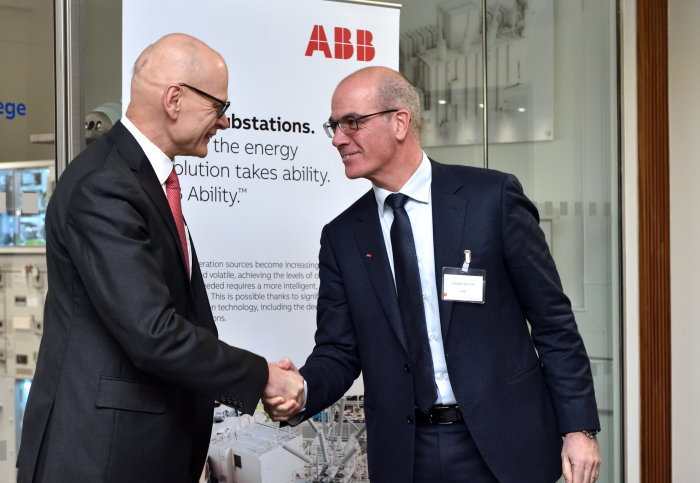New digital energy systems demonstrator opens at Imperial College London

Energy Futures Lab and ABB have launched a facility that allows researchers to investigate the impact of new technologies on the power grid.
The state-of-the-art digital demonstrator is a £1 million investment by one of the College’s long-time partners ABB. It will be used by researchers and students at Imperial to develop their understanding of possible configurations for future low-carbon energy systems.
The facility will enable teams at the College to take their ideas for how to build the power grid of the future and see how they would work in the real world. They can test how different elements of the energy system interact with each other and how they are affected by external factors such as the impact of changes in weather on renewable energy production, unexpected equipment outages or shifting demand patterns.

“I am very proud to be involved in bringing this fantastic new facility to the College. We have had a close relationship for ABB for many years and this is only the first step of what I know will be a new, very fruitful, collaboration”, says Professor Tim Green, Co-Director of Energy Futures Lab, “The demonstrator is an amazing addition to the research and teaching being done at Imperial and will be a key part of our work on the shape of a future low-carbon energy system.”
The demonstrator will be a central part of the new IDLES project, which aims to tackle the issue of the evidence that is used by governments and businesses to formulate their strategies around the long-term evolution of energy systems. However it is also a teaching facility with students having access to learn, apply and demonstrate concepts and ideas from their lectures and coursework.
Claudio Facchin, President of ABB’s Power Grid Division says “ABB has invested in the digital substation demonstrator at Imperial College because we recognise the need to develop a new generation of engineers who will use advanced digital skills and technologies to solve the challenges of the future.” The facility is a significant investment by ABB and includes examples of digitally-enabled substation switchgear, wireless communications and automation systems based on the ABB Ability platform the company provides. It is a similar initiative to the Carbon Capture Pilot Plant in the Department of Chemical Engineering, also in association with ABB, which has seen more than 10,000 researchers and students visit over the last 10 years.
The facility is a significant investment by ABB and includes examples of digitally-enabled substation switchgear, wireless communications and automation systems based on the ABB Ability platform the company provides. It is a similar initiative to the Carbon Capture Pilot Plant in the Department of Chemical Engineering, also in association with ABB, which has seen more than 10,000 researchers and students visit over the last 10 years.
“Strong relationships with industry are a core element of a globally-leading university, informing our research and teaching, through collaborations and projects, so that together we can make a difference to the world,” says Professor Ian Walmsley, Provost of Imperial College London, “In the energy sector and beyond ABB are a key partner, and their investment in this new facility is an indication of their belief in that relationship and commitment to it. The demonstrator will enable our students and researchers to have access to state of the art capabilities, and will have a significant impact on the their work, and the range of ideas they will be able to explore.”

The facility was launched at an event last night in the Department of Electrical and Electronic Engineering by Claudio Facchin President of ABB’s Power Grid Division, Ian Walmsley, Provost of Imperial College London and Craig Lucas the Director of Science and Innovation for Climate and Energy at the Department for Business, Energy & Industrial Strategy.
Article text (excluding photos or graphics) © Imperial College London.
Photos and graphics subject to third party copyright used with permission or © Imperial College London.
Reporter
Neasan O'Neill
Faculty of Engineering